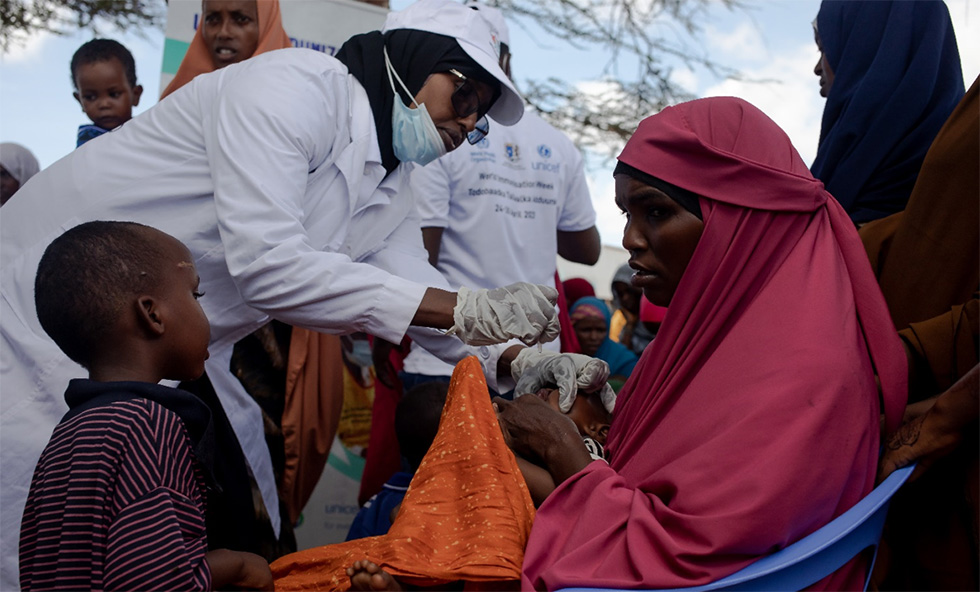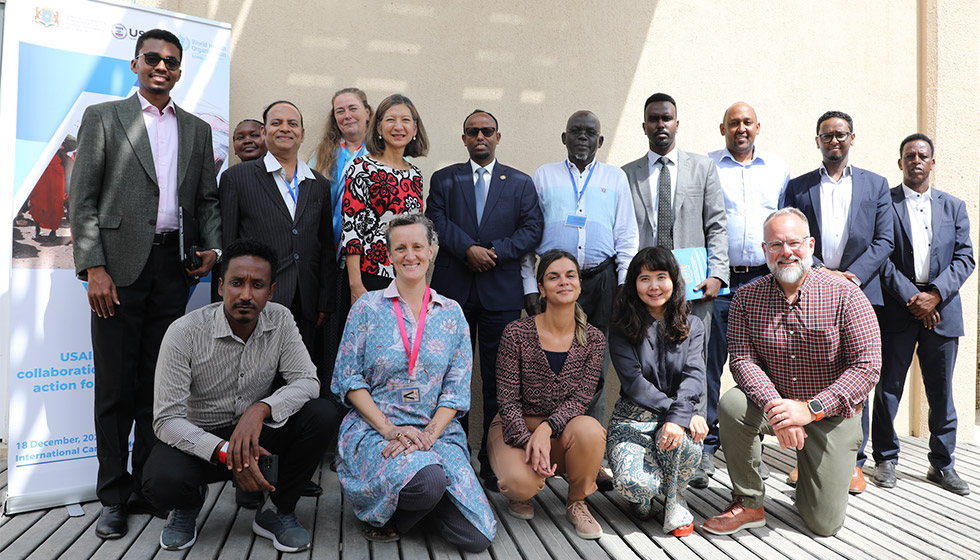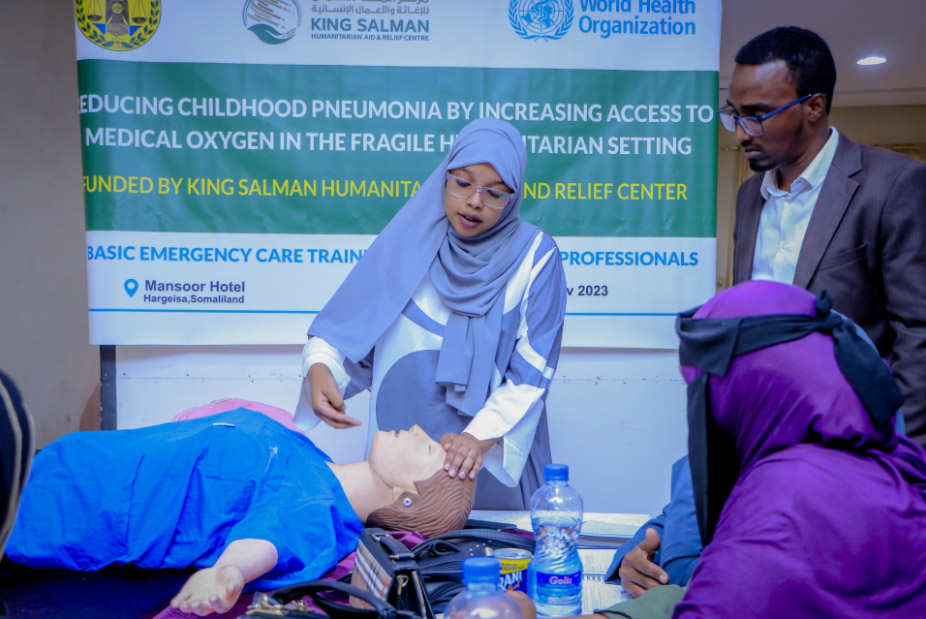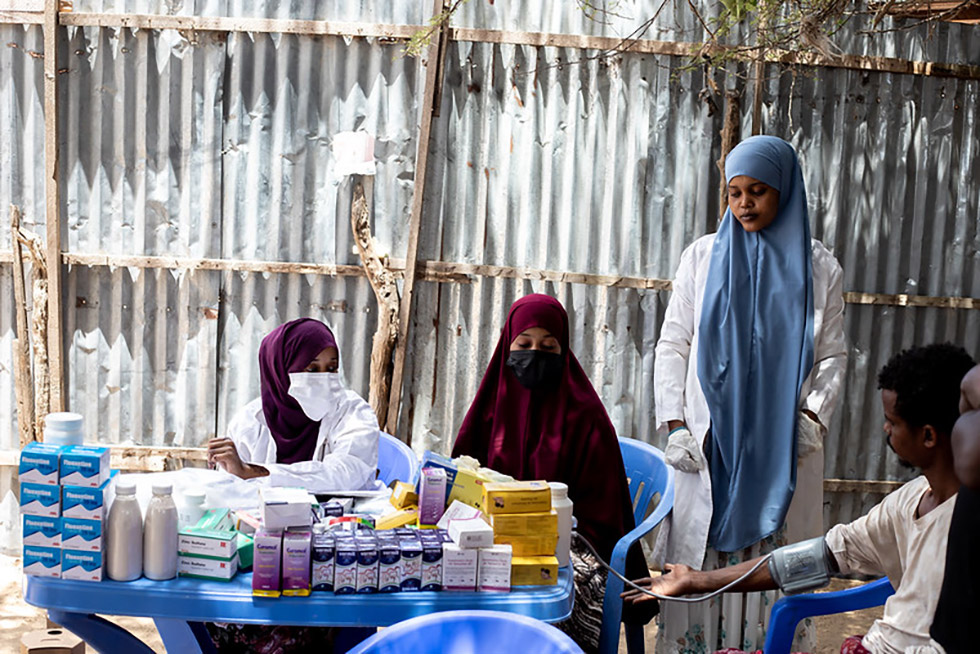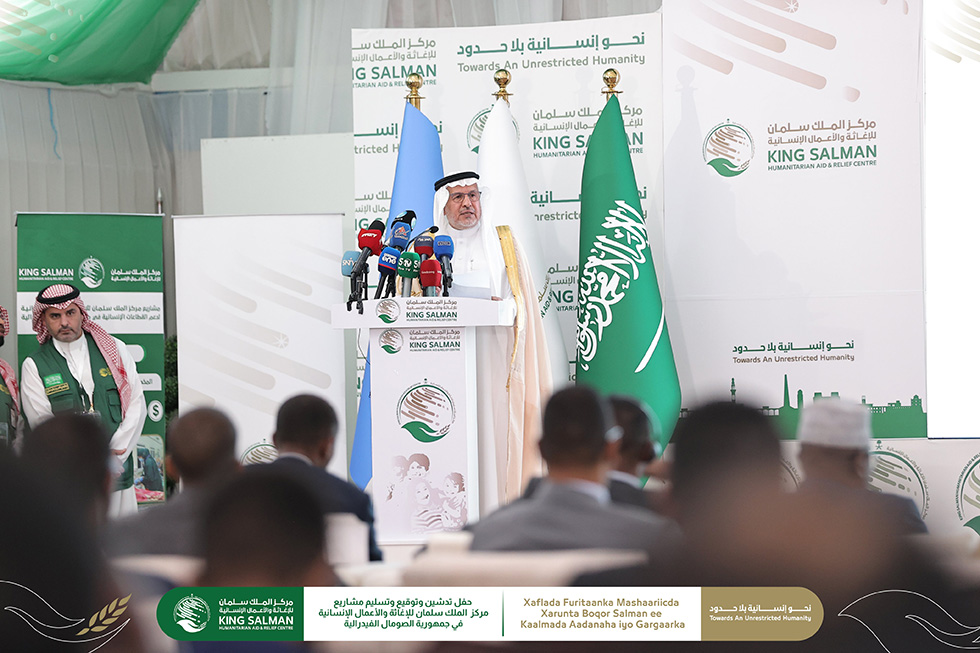 Supervisor General of King Salman Humanitarian Aoid and Relief Centre (KSrelief) His Excellency Abdullah Al Rabeeh address to inaugural ceremony of project in Mogadishu on 28 January 2024. Photo Credit: courtesy KSrelief
Supervisor General of King Salman Humanitarian Aoid and Relief Centre (KSrelief) His Excellency Abdullah Al Rabeeh address to inaugural ceremony of project in Mogadishu on 28 January 2024. Photo Credit: courtesy KSrelief
29 January 2024, Mogadishu, Somalia – A project to reduce the alarmingly high number of child deaths related to pneumonia and diarrhoea in Somalia has been formally launched by King Salman Humanitarian Aid and Relief Centre (KSrelief) and WHO. The Every Breath Counts project aims to increase access to medical oxygen, set up mother and child health care, establish oral rehydration centres and provide integrated health facilities in the fragile humanitarian setting of Somalia.
Child mortality from all causes in Somalia is among the highest in the world. A child born in Somalia today is about 16.5 times more likely to die before the age of 5 years than a child elsewhere. Every Breath Counts aims to reduce pneumonia- and diarrhoea-related morbidity and mortality among children aged under 5 years in the project’s target districts.
Supervisor General of KSrelief His Excellency Abdullah Al Rabeeah launched the project along with Prime Minister of Somalia His Excellency Hamza Abdi Barre, WHO Representative in Somalia Dr Sindani Ireneaus Sebit and other high-ranking government and United Nations officials.
H.E. Mr Hamza Abdi Barre expressed profound thanks to the visiting dignitaries, to Saudi Arabia and to KSrelief for extending much-needed support to Somalia’s fragile health system: “KSrelief and WHO are helping to set up a sustainable health delivery model which will prove beneficial not only for achieving universal health coverage but also Somalia’s key elements of Essential Package of Health Services.”
The project is set to equip 28 health facilities across 10 select drought- and pneumonia-affected districts with solar-powered oxygen concentrators. The project will also provide 90 oxygen cylinders, 15 baby incubators and 4 ambulances in total to the selected health facilities. In addition, the project will help set up 15 triage centres and oral rehydration centres.
H.E. Dr Abdullah Al Rabeeah said on launching the project: “KSrelief is investing in the future of Somalia by providing self-sustainable and environment-friendly solutions and ensuring that selected health facilities can run various medical procedures especially for children and women without power interruptions.”
An estimated 230 127 children aged under 5 years and more than 3.3 million community members will benefit from the project interventions. Over 700 health workers will be trained on screening, outreach and treatment procedures in the course of the project.
Praising KSrelief for investing in saving the lives of Somalia’s children, acting Head of Mission for WHO Somalia country office, Dr Sindani Ireneaus Sebit said: “Contrary to what this situation in Somalia looks like, WHO has shown that community-based outreach programmes involving visits by community health workers to individual households for the diagnosis, treatment and care of pneumonia and diarrhoea and linking these interventions to primary-level care facilities can be a game-changer.”
Currently, the under-five mortality rate in Somalia is 117 per 1000 live births, which is higher than the sub-Saharan African average of 76 deaths per 1000 per live births. Approximately 21% of these deaths among children aged under 5 years in Somalia are attributed to pneumonia, while 18–20% of the deaths are attributed to diarrhoeal diseases alone.
Project interventions
The KSrelief resources will help WHO to set up cost-effective and evidence-based life-saving interventions in 10 districts of Somalia. The focus will be on strengthening community-based preventive, promotive and curative care and care for sick children with symptoms of child pneumonia and diarrhoeal disease.
The project activities will also help strengthen the capacities of primary health care/maternity and child health centres and district hospitals (referral hospitals) to deliver essential health services for pregnant women and people with disabilities. Across the 10 target districts, 28 health facilities will also be equipped to deliver both ambulatory and acute care for sick children diagnosed with pneumonia or diarrhoeal disease.
The services will be aligned within the overarching framework of the Government of Somalia’s vision for universal health coverage. This is consistent with the Government’s plan for implementing its Essential Package of Health Services (EPHS 2020) at the community and primary levels of care to achieve universal health coverage.
Notes to editors
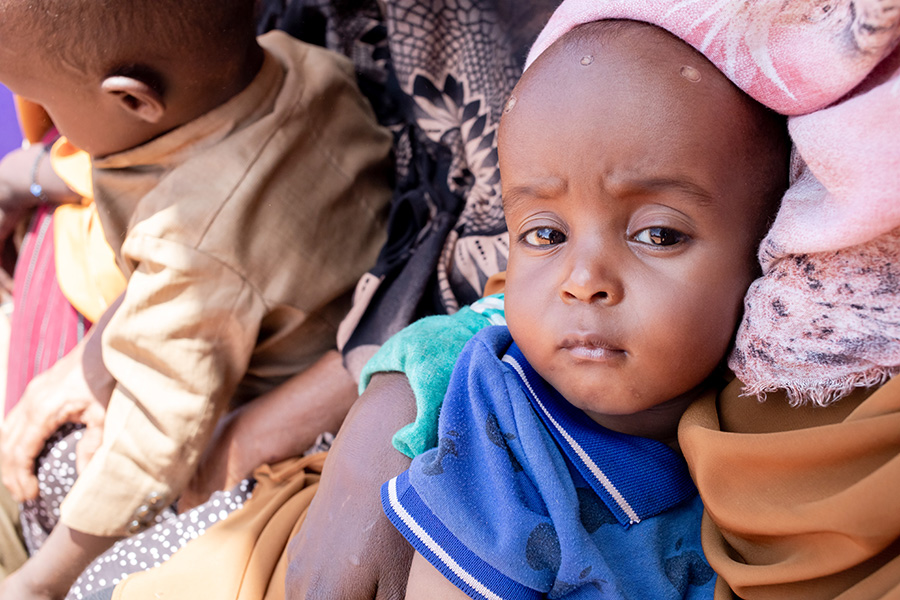 Somalia’s under-five mortality rate is 117 deaths per 1000 live births – one of the highest rates in the world. Photo credit: WHO Somalia/ I. TaxtaThe integrated Global Action Plan for the Prevention and Control of Pneumonia and Diarrhoea set a global target to reduce pneumonia-related deaths in children aged under 5 years to 3 deaths per 1000 live births. Currently, however, there are 39.5 child pneumonia deaths per 1000 live births in Somalia – which shows how far the country is from achieving the global target.
Somalia’s under-five mortality rate is 117 deaths per 1000 live births – one of the highest rates in the world. Photo credit: WHO Somalia/ I. TaxtaThe integrated Global Action Plan for the Prevention and Control of Pneumonia and Diarrhoea set a global target to reduce pneumonia-related deaths in children aged under 5 years to 3 deaths per 1000 live births. Currently, however, there are 39.5 child pneumonia deaths per 1000 live births in Somalia – which shows how far the country is from achieving the global target.
Somalia has a high burden and prevalence of risk factors for childhood pneumonia and diarrhoea, including non-exclusive breastfeeding, overcrowding in camps for internally displaced people, high rates of malnutrition and indoor air pollution, poor immunization coverage, and lack of access to quality health care for sick children at the community level. These factors will continue to contribute to a high number of deaths from these preventable causes if the situation cannot be improved.
The current humanitarian situation in Somalia – which results from protracted conflict, civil war, climatic shock and mass displacement – also contributes to poor health service delivery across the country. This has resulted in poor access to health care for vulnerable groups such as disadvantaged children.
Over 7.8 million people in Somalia are adversely affected by climatic shock – of whom more than 1.1 million have been displaced. The Government has declared the current drought situation an “acute humanitarian emergency” and appealed for emergency assistance from international partners and humanitarian agencies.
The drought situation may further aggravate the health conditions of children aged under 5 years because of children’s worsening nutrition condition and the lack of health services in affected areas. This may lead to excess morbidity and mortality from high-burden diseases such as pneumonia and diarrhoeal diseases.
For additional information, please contact:
Fouzia Bano, Communications Officer, WHO Somalia
Email:
هذا البريد محمى من المتطفلين. تحتاج إلى تشغيل الجافا سكريبت لمشاهدته.
Saeed Ahmed, External Relations /Reporting Officer, WHO Somalia
Email:
هذا البريد محمى من المتطفلين. تحتاج إلى تشغيل الجافا سكريبت لمشاهدته.
For more details about WHO’s response across Somalia, see:
WHO and KSrelief helps trains 28 health professionals on basic emergency care





